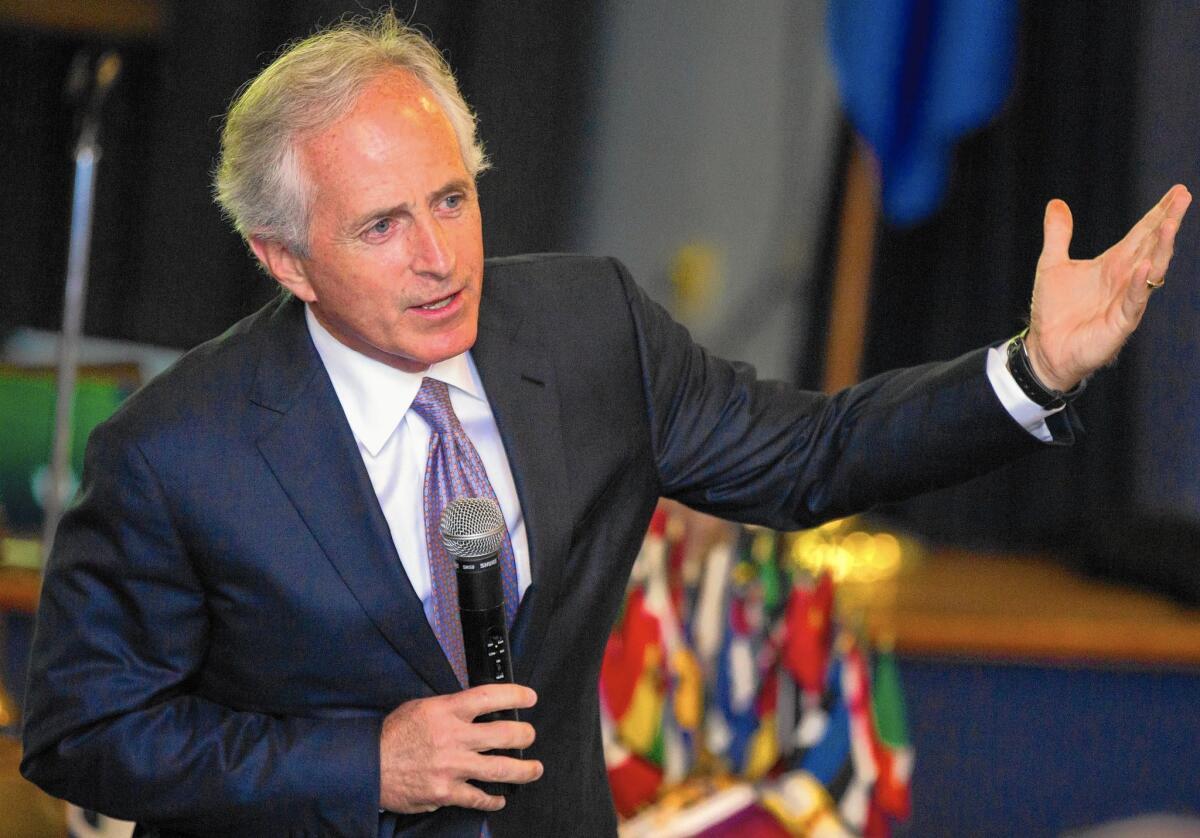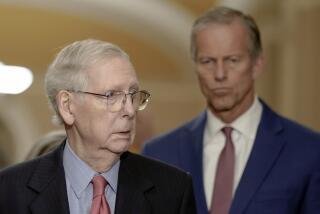Sen. Bob Corker is saying what other Republicans will only whisper about President Trump

At the start of Donald Trump’s presidency, Sen. Bob Corker reacted like most other Republicans to the daily White House outbursts and tweets. He largely withheld criticism and called for patience as the new administration settled in.
Corker, though, stood out by sometimes letting slip what he was privately thinking — an eye roll or head shake, though usually softened by his easy Tennessee banter.
But since announcing that he would not stand for reelection, the chairman of the Senate Foreign Relations Committee has unleashed some of his most unvarnished, inner thoughts about Trump, borrowing from the president’s own preference for direct, public confrontation over diplomacy.
Their war of words spilled into full view over the weekend when Trump tweeted that Corker “didn’t have the guts” to run for reelection and claimed Corker had “begged” for his endorsement, only to be rejected.
The senator, who has been friendly with Trump and was once considered to be Trump’s secretary of State, refuted those claims and deadpanned that “it’s a shame the White House had become an adult day-care center. Someone obviously missed their shift.”
In a wide-ranging interview with the New York Times, Corker warned more ominously that Trump’s foreign policy impulses may be setting the country “on the path to World War III” and that “every single day at the White House, it’s a situation of trying to contain him.”
The remarks provided a stunning glimpse of what other Republicans dare only privately whisper about Trump, despite growing discomfort over the actions at the White House.
“The biggest casualty of Donald Trump’s presidency is political courage,” said Rick Wilson, a Florida Republican consultant who has spoken out repeatedly against Trump.
“All these people who look at their political future and their political survival first, obviously they’re doing the thing that protects them from political destruction in their minds,” he said. “At some point, voters are going to think, ‘Where were you when it was real?’”
Corker, who announced late last month he was not seeking reelection, joins a small cadre of Republicans who — for different reasons — have broken party ranks to defy Trump.
Sen. John McCain (R-Ariz.), who survived as a prisoner of war in Vietnam and is now battling brain cancer, has long viewed himself as a party maverick and is hardly pricked by Trump’s tweets.
Sen. Lindsey Graham (R-S.C.) has managed to call out Trump at times, enduring his wrath but still maintaining a relationship. He was even rewarded Monday with a golf outing with the president.
Sens. Jeff Flake (R-Ariz.) and Ben Sasse (R-Neb.) have gained national stature for their willingness to speak out against the president, although the Arizonan’s standing in the polls has tumbled dramatically since his book tour bashing Trump.
Those senators understand that the president needs their votes in Congress almost as much as they need his political support, especially now that his legislative agenda has stalled on Capitol Hill, including the embarrassing narrow defeat of the GOP’s Obamacare repeal.
The White House has few votes to spare on its next major initiative, tax reform, which is in serious jeopardy in Congress as Republicans pursue a partisan strategy that is unlikely to win over support from Democrats.
Corker will be key to the president’s success, and the senator, who is conservative on fiscal issues, has already raised concerns over the proposed $1.5 trillion in deficit-financed tax cuts. His could become a decisive vote — much the way McCain’s objections helped defeat the GOP’s attempt to repeal the Affordable Care Act.
Senate Majority Leader Mitch McConnell (R-Ky.) sought to de-escalate tensions Monday, calling Corker “a particularly important part of the budget debate, which will be on the floor next week,” according to the Associated Press.
Some see political calculations in both Corker’s sudden public criticism of Trump and of his decision to step down, which came around the time Trump’s former adviser Stephen K. Bannon began eyeing potential primary challengers to Republicans viewed as insufficiently aligned with Trump’s agenda, including Corker.
As recently as last Monday, however, Trump had encouraged Corker to run again, pledging White House backing, according to those familiar with the conversation.
But since arriving in Washington in 2007, Corker has repeatedly shown a willingness to go his own way, perhaps most notably when he joined with Democrats to support immigration reform in 2013.
Despite his genteel Southern drawl, Corker can also be a brawler. He started his career, as Trump did, on construction sites, a manager who ditched the office to learn from the tradesmen as a card-carrying union member. He went on to become a wealthy developer.
Until Sunday, it was Trump’s equivocating response to the August neo-Nazi march in Charlottesville, Va., that had brought out Corker’s most fulsome criticism. Corker, in pointed comments, said the president had “not yet been able to demonstrate the stability nor some of the competence” needed to be successful.
Last week Corker went further, defending Secretary of State Rex Tillerson as part of a core group of advisers “that help separate our country from chaos.” He did not mention Trump, but many assumed he was referring to the president’s erratic behavior.
Others, though, are unlikely to swiftly follow his lead.
“There’s a conventional wisdom that Republican politicians are scared of Trump or Trump tweets,” said Tim Miller, a GOP political consultant who served as a spokesman to an anti-Trump political committee during the campaign. “The reality is a lot of them are scared of their own voters and fear that they lost their sense of what Republican base voters want.”
ALSO
Is this small-town congressman from New Mexico tough enough to win Democrats the House majority?
More coverage of politics and the White House
More to Read
Get the L.A. Times Politics newsletter
Deeply reported insights into legislation, politics and policy from Sacramento, Washington and beyond. In your inbox three times per week.
You may occasionally receive promotional content from the Los Angeles Times.








